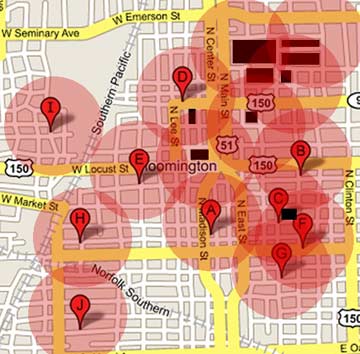
It’s time to talk, once again, about one of the worst bills around —
H.R.1528: Defending America’s Most Vulnerable: Safe Access to Drug Treatment and Child Protection Act of 2005, sponsored by James F. Sensenbrenner (WI-5).
TalkLeft and Last One Speaks have some good descriptions (and TalkLeft has now added a great one here), and I’ve written about it a few times as well. Families Against Mandatory Minimums has some good info, including an excellent Summary (pdf) by Mary Price and Jim Cho.
Everybody really needs to take action on this one. NORML has an action alert, as does Drug Policy Alliance. (No excuse not to do it — all it takes is a minute online.)
Jackl (a regular reader), has spent some time at the House of Representatives site of the hearing that was held on April 12, including watching the full video (he’s got a lot more fortitude than I). As he said to me: “I was struck by how retrograde the thinking of this subcommittee was. It’s like these guys have been living in a cave for 35 years to not see how clueless and harmful their ideology is…”
So let’s take a quick look first at the guests invited to testify at the hearing:
- Ronald E. Brooks, President, National Narcotics Officer’s Association Coalition. OK, now this guy is a dangerous, semi-illiterate goon. He’ll also say just about anything to protect narcotics budgets. Check out my earlier post about him.
- Jodi L. Avergun, Chief of Staff, Drug Enforcement Administration — the usual DEA/Justice Dept. type advocate for more government power. (don’t know too much about her)
- Lori Moriarty, President, Colorado Alliance for Drug Endangered Children. Awww, the nice lady is in charge of a children’s organization. How nice. Except that Lori Moriarty is also Commander of the Denver North Metro Drug Task Force — one of the worst task forces in the country. It was her task force that forced a woman to strip naked in the parking lot of her condominium in full view of her neighbors while male law enforcement officers conducted an unjustified, humiliating, and degrading “decontamination” ritual that had no legitimate purpose. It was her task force that ignored the constitution and tried to force the Tattered Cover Book Store into releasing the records of what books their customers bought. Her task force has interfered with medical marijuana patients, and rides up to their drug busts in a retrofitted 1981 Peacekeeper armored personnel carrier. Can you say psycho bitch from hell?
- William Brownsberger, Associate Director for Public Policy Division on Addictions, Harvard Medical School. Now Jackl tells me that he turns out (on the video) to be as much a prohibitionist as the rest, but he did bring the one dissenting opinion, having to do with school zones.


Brownsberger discussed the extensive school drug zones that had been tried in Massachusetts. He said the zones, since they were so large, had no deterrent effect, and made almost every drug sale in high population areas, subject to school zone enhancements (despite the fact that less than 1% of the sales involved school kids and most took place when school was not in session).
This is particularly relevant, since HR 1528 expands school zones from 100 feet to 1,000 feet and adds other categories (the exclusion zones would include schools, pools, day care centers, libraries, video arcades, and drug treatment facilities).
So I decided to try an experiment with my community. This is my local area with an estimate of the enhanced penalty zones only including day care centers and schools that showed up in Google (not including video arcades, pools, libraries or drug treatment facilities).

Note that not only are there very few places not covered, but it would be impossible for a drug dealer to know the location of all the enhanced-penalty zones. And this is in a neighborhood that isn’t very densely populated (almost nothing above 2 stories tall). Inner city areas would have virtually no “open” locations.
Now check out another provision of 1528: a new penalty for selling or giving drugs to someone who is in drug treatment, or is scheduled to be in drug treatment, or who has been in drug treatment in the past. Now how can such a law possibly affect what a drug dealer might do. Would they start asking for proof that someone’s never been in treatment? Impossible.
It is clear that the lawmakers have absolutely no interest in deterrence. There’s no way that these provisions can have a deterrent effect. What they want is weapons to use against certain segments of society — primarily inner city, poor areas — where they can pile on charges to put relatively harmless individuals away for 5 years, 10 years, or even life.
And almost every provision in this bill is going after the small fish with a huge club.
The bill also eliminates almost all discretion in sentencing, except for power given specifically to the prosecutor. (Can someone remind me where the founding fathers said that our rights and justice should be turned over solely to prosecutors?) Those who have information to trade may get a break, but those who don’t know anything will have the full sentence with no possible options.
The “turn in your friends and neighbors or go to jail” rule: This is truly offensive, and I would be a criminal under this provision. This is in the “Failure to protect children from drug trafficking activities” section. This would include a 2-year sentence for those who witness or learn about drug distribution near colleges and do not report it to authorities within 24 hours and do not provide full assistance investigating, apprehending, and prosecuting the offender. I work at a university. It’s impossible not to learn of drug sales unless you’re completely clueless. Most of the students themselves would be in violation of this snitch law.
[Hey, why don’t we take this snitch law into other areas. Two year in prison for anyone seeing someone drive above the speed limit with children in the car, who doesn’t write down the license plate number and report it within 24 hours. Or better yet, two years in prison for a legislator who sees another legislator draft unconstitutional bills and doesn’t report it to the ethics committee.]
There’s a bunch of other offenses that require snitching under this bill as well. And there are so many other offensive sections of this bill. Read the entire summary (pdf) to see what I mean.
I’d like to believe that our Congress would recognize this as an odious bill and reject it out of hand… I’d like to believe that, but I don’t. We need to do everything we can to apply pressure to make sure that they won’t pass this.

